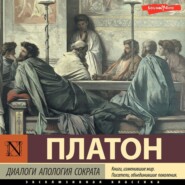По всем вопросам обращайтесь на: info@litportal.ru
(©) 2003-2024.
✖
Phaedo
Настройки чтения
Размер шрифта
Высота строк
Поля
The search, replied Cebes, shall certainly be made. And now, if you please, let us return to the point of the argument at which we digressed.
By all means, replied Socrates; what else should I please?
Very good.
Must we not, said Socrates, ask ourselves what that is which, as we imagine, is liable to be scattered, and about which we fear? and what again is that about which we have no fear? And then we may proceed further to enquire whether that which suffers dispersion is or is not of the nature of soul – our hopes and fears as to our own souls will turn upon the answers to these questions.
Very true, he said.
Now the compound or composite may be supposed to be naturally capable, as of being compounded, so also of being dissolved; but that which is uncompounded, and that only, must be, if anything is, indissoluble.
Yes; I should imagine so, said Cebes.
And the uncompounded may be assumed to be the same and unchanging, whereas the compound is always changing and never the same.
I agree, he said.
Then now let us return to the previous discussion. Is that idea or essence, which in the dialectical process we define as essence or true existence – whether essence of equality, beauty, or anything else – are these essences, I say, liable at times to some degree of change? or are they each of them always what they are, having the same simple self-existent and unchanging forms, not admitting of variation at all, or in any way, or at any time?
They must be always the same, Socrates, replied Cebes.
And what would you say of the many beautiful – whether men or horses or garments or any other things which are named by the same names and may be called equal or beautiful, – are they all unchanging and the same always, or quite the reverse? May they not rather be described as almost always changing and hardly ever the same, either with themselves or with one another?
The latter, replied Cebes; they are always in a state of change.
And these you can touch and see and perceive with the senses, but the unchanging things you can only perceive with the mind – they are invisible and are not seen?
That is very true, he said.
Well, then, added Socrates, let us suppose that there are two sorts of existences – one seen, the other unseen.
Let us suppose them.
The seen is the changing, and the unseen is the unchanging?
That may be also supposed.
And, further, is not one part of us body, another part soul?
To be sure.
And to which class is the body more alike and akin?
Clearly to the seen – no one can doubt that.
And is the soul seen or not seen?
Not by man, Socrates.
And what we mean by 'seen' and 'not seen' is that which is or is not visible to the eye of man?
Yes, to the eye of man.
And is the soul seen or not seen?
Not seen.
Unseen then?
Yes.
Then the soul is more like to the unseen, and the body to the seen?
That follows necessarily, Socrates.
And were we not saying long ago that the soul when using the body as an instrument of perception, that is to say, when using the sense of sight or hearing or some other sense (for the meaning of perceiving through the body is perceiving through the senses) – were we not saying that the soul too is then dragged by the body into the region of the changeable, and wanders and is confused; the world spins round her, and she is like a drunkard, when she touches change?
Very true.
But when returning into herself she reflects, then she passes into the other world, the region of purity, and eternity, and immortality, and unchangeableness, which are her kindred, and with them she ever lives, when she is by herself and is not let or hindered; then she ceases from her erring ways, and being in communion with the unchanging is unchanging. And this state of the soul is called wisdom?
That is well and truly said, Socrates, he replied.
And to which class is the soul more nearly alike and akin, as far as may be inferred from this argument, as well as from the preceding one?
I think, Socrates, that, in the opinion of every one who follows the argument, the soul will be infinitely more like the unchangeable – even the most stupid person will not deny that.
And the body is more like the changing?
Yes.
Yet once more consider the matter in another light: When the soul and the body are united, then nature orders the soul to rule and govern, and the body to obey and serve. Now which of these two functions is akin to the divine? and which to the mortal? Does not the divine appear to you to be that which naturally orders and rules, and the mortal to be that which is subject and servant?
True.
And which does the soul resemble?
The soul resembles the divine, and the body the mortal – there can be no doubt of that, Socrates.
Then reflect, Cebes: of all which has been said is not this the conclusion? – that the soul is in the very likeness of the divine, and immortal, and intellectual, and uniform, and indissoluble, and unchangeable; and that the body is in the very likeness of the human, and mortal, and unintellectual, and multiform, and dissoluble, and changeable. Can this, my dear Cebes, be denied?
It cannot.
But if it be true, then is not the body liable to speedy dissolution? and is not the soul almost or altogether indissoluble?
Certainly.
And do you further observe, that after a man is dead, the body, or visible part of him, which is lying in the visible world, and is called a corpse, and would naturally be dissolved and decomposed and dissipated, is not dissolved or decomposed at once, but may remain for a for some time, nay even for a long time, if the constitution be sound at the time of death, and the season of the year favourable? For the body when shrunk and embalmed, as the manner is in Egypt, may remain almost entire through infinite ages; and even in decay, there are still some portions, such as the bones and ligaments, which are practically indestructible: – Do you agree?

















